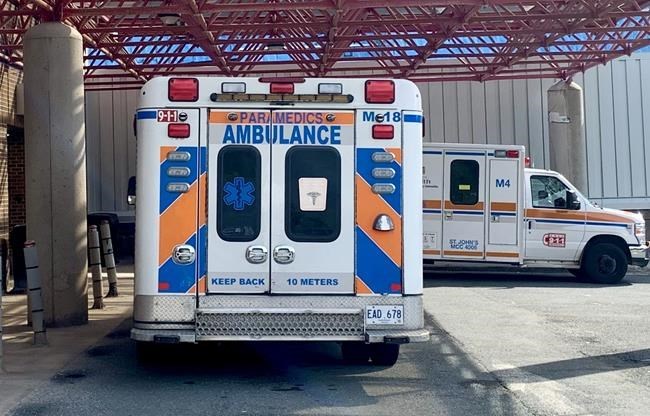ST. JOHN'S, N.L. — Nearly 12 hours after an emergency sitting began in Newfoundland and Labrador's legislature, the government passed a bill that sent striking first responders back to work.
Members of all three political parties stood and applauded after the bill passed shortly after 9 p.m. They first sat down to begin discussing the legislation at 10 a.m.
"We've made great progress today as a collective house," said John Hogan, the province's justice minister and government house leader just before the bill passed its third reading.
The politicians did much of their work as striking first responders and their colleagues filled the public gallery above, all wearing their bright, reflective work jackets.
About 120 workers with seven private ambulance operators walked off the job Friday, with wages and pensions being the main issues. The seven operators are owned by Fewer's Ambulance Service.
The province relies on 25 private and 22 community-owned ambulance operators and pays them a total of $34 million in block funding for their services. The strike affected much of rural Newfoundland, including the towns of Stephenville, Bonavista and Conception Bay South, which is just outside St. John's.
The bill passed Monday night deemed the province's private ambulance services essential and mandated an immediate end to the strike. It also required the union and employer to reach an agreement on what type of workers are essential and how many of them are needed to carry out essential paramedic services.
The legislation allows the strike to resume as long as those essential services are provided.
Meghan Quilty was among the paramedics who began the day outside the legislature, waving signs and flags in solidarity with those on strike.
"My brother works at McDonald's; he made more than me," Quilty said. "I don't do it for the money, but I also should be able to survive and not be struggling when I'm dealing with medical care and patients' lives."
Premier Andrew Furey called for the legislature to open Monday to address the strike, saying the situation posed a risk to Newfoundlanders' and Labradorians' well-being. His government had said backup plans were in place to provide ambulance coverage during the strike, but Furey said Monday that they couldn't be relied on indefinitely.
The bill passed Monday is not back-to-work legislation, Furey told reporters, noting that the workers can return to the picket line once negotiations about essential services conclude.
The legislation also allows the union and its employer to appeal to an independent third party if they cannot come to an agreement about issues such as wages and working conditions, he added.
Official Opposition leader David Brazil said the labour conflict shows that the province needs a better model for paramedic services.
"There shouldn't be a two-tiered ambulance service here," the Progressive Conservative told reporters. "There needs to be a real deep dive in here. We need to have a real conversation about how do we speed up the process here and make sure that ambulance services, like a lot of the other health-care services … are equal across the board."
Hubert Dawe, a leader with Teamsters Local 855, said Sunday that the union has asked for years that the province's ambulance services be declared essential. Dawe said his members who work as first responders for private ambulance operators are paid less than those who are employed by the province.
"It's not sitting well with our members that we're not providing emergency service," Dawe added. "But this is where we've been pushed, unfortunately."
This report by The Canadian Press was first published Jan. 23, 2023.
Sarah Smellie, The Canadian Press


